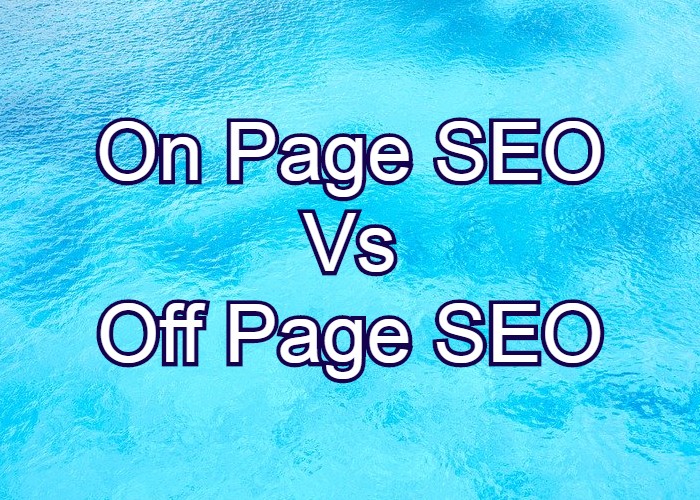On-page Optimization and Off-Page Optimization – If you have approached any SEO (Search Engine Optimization) agency, you might have come across the mention of these two terms in their SEO packages. Who do they mean? What is the difference between On-page and Off-page SEO? How do they contribute to your digital presence and SEO ranking?
Today, I’m here to answer all these queries through this SEO blog post.
What is On-Page SEO
Also known as On-Page Optimization, On-Page SEO is setting your house (website) in order. Would you like your home to be a mess, where it’s difficult to find things you want? Certainly, you will not want guests to see the clutter and disorder.
This simple analogy stands true for your website. A site with a well-defined navigation, breadcrumbs, URL structure, functional elements, sensible engaging content that enables a great user experience (UX) across desktop and mobile is the top priority of Google and your target audience.
On-Page SEO Activities
- Build a fully-functional and responsive website
- Make your site mobile-friendly
- Ensure the least loading time below 2.5 seconds
- Perform thorough SEO keyword research and analysis
- Publish engaging and purposeful content (textual and media)
- Write SEO Meta tags wisely to make it clickable
- Pay attention to image optimization (Tell Google about your image, do not use generic filenames like “image1.jpg”, “pic.gif”, “1.jpg”)
Important Guidelines for Web Designers and Developers
- Apply recognizable standard user-friendly naming convention
- Follow Web Content Accessibility Guidelines 2.0
- Use minimal coding for page styling and functionality
- Use JPEG 2000, JPEG XR, or WebP images
- Use font-display feature to ensure text is user-visible
- Delete or remove unused CSS
More details available with Google Test My Site Tool
Important Guidelines for Web Designers and Developers
- Avoid deep nesting of subdirectories like “…/dir1/dir2/dir3/dir4/dir5/dir6/page.html
- Use relevant directory name
- Avoid pages from subdomains and the root directory access the same content, for example, “domain.com/page.html” and “sub.domain.com/page.html
- Avoid Inserting numerous unnecessary keywords aimed at search engines but are annoying or nonsensical to users.
- Spamming link requests out to all sites related to your topic area.
- Purchasing links from another site with the aim of getting PageRank
What is Off-Page SEO
As the term says, Off-page SEO is something that is done outside the website that needs to be promoted. This is done to make the website notable to other websites or businesses that have audiences common to yours.
Off-Page SEO Activities
- Business Directory Submission
- Customer review-site engagement
- Commenting
- Forums discussion engagement
- Influencer Outreach
- Guest Author
- Broken Link Building
- Social Networking
- Social Bookmarking
- Content Marketing
- Questions & Answers
- Newsletters
Important Guidelines for Content Writers
Content is the king. You must hire an experienced content writer, who knows well about your product or service and the target audience. Here is a questionnaire that can guide your content writer to generate valuable website content that complements your on-page and off-page optimization marketing effort.
Content and quality questions
- Does the content provide original information, reporting, research or analysis?
- Does the content provide a substantial, complete or comprehensive description of the topic?
- Does the content provide insightful analysis or interesting information that is beyond obvious?
- If the content draws on other sources, does it avoid simply copying or rewriting those sources and instead provide substantial additional value and originality?
- Does the headline and/or page title provide a descriptive, helpful summary of the content?
- Does the headline and/or page title avoid being exaggerating or shocking in nature?
- Is this the sort of page you’d want to bookmark, share with a friend, or recommend?
- Would you expect to see this content in or referenced by a printed magazine, encyclopedia or book?
Expertise questions
- Does the content present information in a way that makes you want to trust it, such as clear sourcing, evidence of the expertise involved, background about the author or the site that publishes it, such as through links to an author page or a site’s About page?
- If you researched the site producing the content, would you come away with the impression that it is well-trusted or widely-recognized as an authority on its topic?
- Is this content written by an expert or enthusiast who demonstrably knows the topic well?
- Is the content free from easily-verified factual errors?
- Would you feel comfortable trusting this content for issues relating to your money or your life?
On-Page and Off-page – though they are different website optimization activities, but they complement each other. Here is how.
Referral traffic that you gain through off-page works contributes to the SEO ranking. Google considers referral traffic as a positive thing about your website because other websites or webmasters are considering worth diverting their users to your website to seek valuable information. The growing referral traffic increases your domain authority and pushes your site up in the SERP, and great on-site SEO makes users stay and engage on the website and help you get conversions.
It’s important you know what you are getting out of the SEO marketing effort. Keep a track using Google Search Console and Google Analytics.
Got more queries about on-page or off-page SEO, leave your comment, and I will answer them at the earliest.
